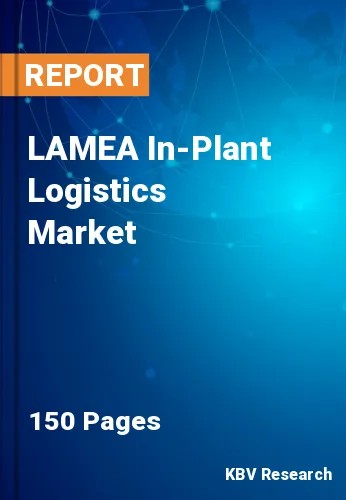The Latin America, Middle East and Africa In-Plant Logistics Market would witness market growth of 12.0% CAGR during the forecast period (2023-2030).
The market is competitive, with several players offering various solutions and services tailored to optimize material handling, inventory management, and logistics operations within manufacturing facilities and warehouses. Companies specializing in these logistics solutions offer diverse services, including automation, warehouse management systems (WMS), and software solutions tailored to optimize internal logistics operations. Traditional logistics service providers offering these logistics services cater to managing material flow, inventory control, and transportation within industrial facilities. Consulting enterprises specializing in logistics and supply chain optimization and system integrators offer advisory services and assist companies in designing and implementing tailored the solutions.
Overall, competition in the market revolves around providing cost-effective, efficient, and innovative solutions that address the complex needs of modern manufacturing and warehouse environments. Companies differentiate themselves through technological advancements, customized solutions, industry expertise, service quality, and the ability to adapt to evolving customer needs and market inclination. Maintaining a competitive edge often involves continuous innovation, investment in R&D, and a keen focus on delivering value-added services to clients.
The LAMEA region has seen a steady increase in air passenger and freight traffic, driven by economic growth, tourism, and globalization. According to the Industrial Center, the Saudi Arabian government has introduced the National Industrial Strategy (NIS), an all-encompassing blueprint designed to expedite and broaden the industrial landscape of the Kingdom. The NIS seeks to establish a competitive and adaptable private sector that is sustainable and industrially oriented. Three times as many factories (36 thousand) as in 2022, and manufacturing exports worth $148 billion (5.3 times the value of exports in 2020) by 2035. Hence, the region presents lucrative growth prospects for the market.
The Brazil market dominated the LAMEA In-Plant Logistics Market by Country in 2022 and would continue to be a dominant market till 2030; thereby, achieving a market value of $526.1 million by 2030. The Argentina market is showcasing a CAGR of 12.6% during (2023 - 2030). Additionally, The UAE market would register a CAGR of 11.7% during (2023 - 2030).
Based on Location, the market is segmented into Assembly/Production Lines, Storage Facilities, Packaging Workstations, and Others. Based on Product, the market is segmented into Cranes, Conveyors & Sortation Systems, Automated Storage & Retrieval System, Warehouse Management System, Automated Guided Vehicles, Robots, and Others. Based on Application, the market is segmented into Automotive, Aviation, Food & Beverages, Metals & Heavy Machinery, Semiconductor & Electronics, Healthcare, and Others. Based on countries, the market is segmented into Brazil, Argentina, UAE, Saudi Arabia, South Africa, Nigeria, and Rest of LAMEA.
Free Valuable Insights: The Worldwide In-Plant Logistics Market is Projected to reach USD 24.5 Billion by 2030, at a CAGR of 10.4%
The market research report covers the analysis of key stake holders of the market. Key companies profiled in the report include JBT Corporation, KION GROUP AG, Hyster-Yale Materials Handling, Inc., Toyota Industries Corporation, SSI Schaefer Group, Murata Machinery, Ltd., BEUMER Group GmbH & Co. KG, Honeywell International, Inc., Daifuku Co., Limited and Kuka AG (Midea Group Co., Ltd.)
By Location
By Product
By Application
By Country
Our team of dedicated experts can provide you with attractive expansion opportunities for your business.

